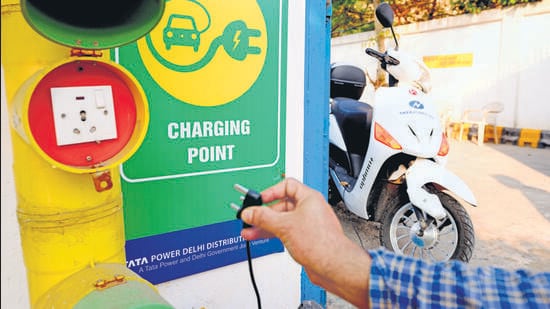Our Terms & Conditions | Our Privacy Policy
Delhi’s EV push not enough to cut transport emissions, warn experts | Latest News Delhi
Transport and emissions experts on Tuesday said that while Electric Vehicle (EV) uptake in Delhi has crossed 12%, the transition alone may not be a viable solution to cut transport-related emissions in the Capital.
Experts emphasised the need for a comprehensive, data-driven framework to guide future mobility policies. (Mint Archive)
Speaking at a session during Connect Karo 2025 organised by WRI India, experts noted that frequent technological shifts and changing norms often deliver short-term, superficial results without addressing long-term challenges.
Gazala Habib, professor at IIT Delhi, said the rush to push EVs in Delhi overlooks the city’s lack of preparedness to deal with the waste generated.
“Increasing EVs is not really helping with ‘zero emission’ as it also means higher electricity consumption, and our power generation is still largely fossil fuel-based. Moreover, if all vehicles move to EVs, are we prepared for the disposal of batteries that will also increase? We do not have the infrastructure for it as of now,” she said.
Habib added that reducing emissions requires realistic monitoring and assessment, along with multiple measures, rather than relying on a single technology.
Representatives from the trucking industry also flagged practical concerns. Pradeep Singhal, general secretary of the All India Truckers Welfare Association, said, “The truck industry operates at a very low margin and already faces competition from railways and inland waterways. The push towards frequently changing vehicles—from BSIV to BSVI to electric—adds to costs. We do not mind switching if the technology is not obsolete before at least the loans are paid. It is a matter of livelihoods.”
Experts further noted that India’s urban mobility planning has channelled significant investments into metro rail and electric buses, in line with national goals. However, rising private vehicle use is worsening air quality, safety, and equity due to weak holistic planning and limited commuter data. They emphasised the need for a comprehensive, data-driven framework to guide future mobility policies.
Other panellists included Anumita Roychowdhury from Centre for Science and Environment, Dhavala Srinivas from Delhi Integrated Multi-Modal Transit System , Harshal Salve from AIIMS and Anup Patil from Intangles.
Images are for reference only.Images and contents gathered automatic from google or 3rd party sources.All rights on the images and contents are with their legal original owners.



Comments are closed.